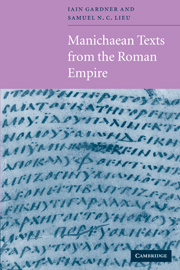Book contents
- Frontmatter
- Contents
- List of plates
- List of maps
- List of contributors
- Preface
- Acknowledgements
- Notes for the reader
- List of abbreviations
- Map 1 The Sassanian Empire
- Map 2 The Roman Empire
- 1 Introduction
- 2 The life of Mani
- 3 Manichaeism in the Roman Empire
- 4 The scriptures of Mani
- 5 Teachings
- 6 Worship and ethic
- 7 Community texts
- List and concordance of texts
- Glossary
- Bibliography
- Index
7 - Community texts
Published online by Cambridge University Press: 10 December 2009
- Frontmatter
- Contents
- List of plates
- List of maps
- List of contributors
- Preface
- Acknowledgements
- Notes for the reader
- List of abbreviations
- Map 1 The Sassanian Empire
- Map 2 The Roman Empire
- 1 Introduction
- 2 The life of Mani
- 3 Manichaeism in the Roman Empire
- 4 The scriptures of Mani
- 5 Teachings
- 6 Worship and ethic
- 7 Community texts
- List and concordance of texts
- Glossary
- Bibliography
- Index
Summary
As we have seen, the study of Manichaeism has been transformed by the discoveries of actual primary sources written by members of the community itself. This marked an enormous step forward over the prior reliance on accounts by mostly hostile opponents. Nevertheless, finds such as the Medinet Madi library and the Mani Codex have been of literary texts, and are still divorced from the presence of the living communities who created and used them. Thus, a further transformation of the discipline can be claimed for the recovery of Manichaean documentary texts, which evidence this living presence and the actual practice of the faith.
Most notable, in this regard, is the substantial archive of Coptic and Greek personal letters recovered from House Three at Ismant el-Kharab, many of which provide evidence of having been written by Manichaeans. The correlation between these, the fragments of Manichaean religious texts from the same site, and the material context excavated by professional archaeologists, provides a first opportunity to study this actuality of the community in the Roman Empire of the fourth century. A further consequence of now knowing how Manichaeans communicated and related to each other, and the specifics of their epistolary conventions, is that it has been possible already to re-classify two previously known documents as Manichaean, with the promise of further such developments in the future. All of this substantially advances our understanding of what it meant to belong to that community, and of how believers constructed their identity especially in relation to Christians.[…]
Information
- Type
- Chapter
- Information
- Manichaean Texts from the Roman Empire , pp. 259 - 281Publisher: Cambridge University PressPrint publication year: 2004
